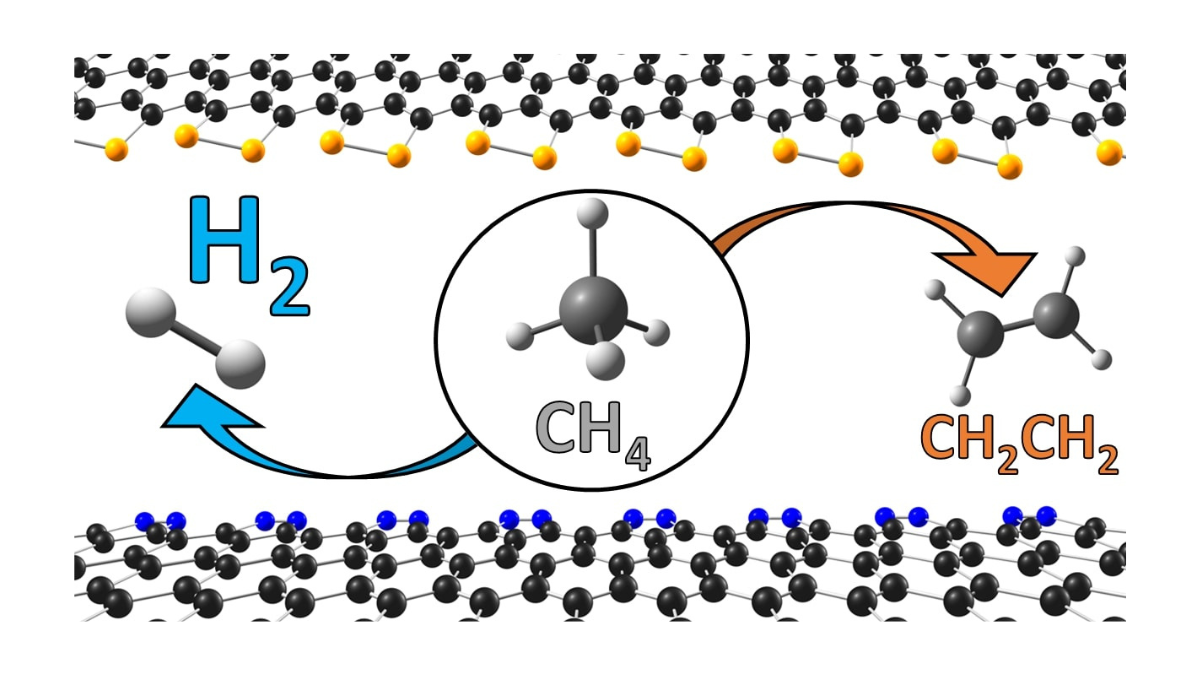‘Game-changing’ findings for sustainable hydrogen production
Hydrogen fuel could be a more viable alternative to traditional fossil fuels, according to University of Surrey researchers who have found that a type of metal-free catalysts could contribute to the development of cost-effective and sustainable hydrogen production technologies.

The study has shown promising results for the use of edge-decorated nano carbons as metal-free catalysts for the direct conversion of methane, which is also a powerful greenhouse gas, into hydrogen. Among the nano carbons investigated, nitrogen-doped nano carbons presented the highest level of performance for hydrogen production at high temperatures.
Crucially, the researchers also found that the nitrogen-doped and phosphorous-doped nano carbons had strong resistance to carbon poisoning, which is a common issue with catalysts in this process.
Dr Neubi Xavier Jr, the Research Fellow who performed the material science simulations, said:
"Our results suggest that using edge-decorated nano carbons as catalysts could be a game-changer for the hydrogen industry, offering a cost-effective and sustainable alternative to traditional metal catalysts. At the same time, this process gets rid of methane, which is a fossil fuel involved in global warming."
Hydrogen fuel is a clean and renewable energy source that has the potential to reduce carbon emissions and decrease our dependence on fossil fuels. When used as a fuel, hydrogen can power vehicles, generate electricity, and heat buildings. The only by-product of hydrogen fuel is water vapour, making it an environmentally friendly alternative to traditional fossil fuels.
However, the production of hydrogen fuel is currently reliant on fossil fuels, which creates carbon emissions in the process, and metal catalysts, which mining and manufacturing are energy intensive and can negatively affect the environment. Therefore, the development of sustainable hydrogen production methods and catalytic materials is crucial to realising the full potential of hydrogen fuel as a clean energy source.
The research was conducted by a team led by Dr Marco Sacchi from the University of Surrey, an expert in the field of sustainable energy and computational chemistry, who combined quantum chemistry, thermodynamics and chemical kinetics to determine the most efficient edge decoration for hydrogen production.
Dr Sacchi said:
"One of the biggest challenges with catalysts for hydrogen production is that they can get poisoned by carbon. But our study found that nitrogen and phosphorous-doped nano carbons are pretty resistant to this problem. This is a huge step forward for sustainable hydrogen production."
The full article can be found in ACS Applied Materials & Interfaces.
###
· Reference: First Principles Microkinetic Modelling Unravelling the Performance of Edge-Decorated Nanocarbons for Hydrogen Production from Methane; Neubi F. Xavier Jr et al; ACS Applied Materials & Interfaces; January 2023; 10.1021/acsami.2c20937.
· Dr Neubi Xavier Jr and Dr Marco Sacchi are available for interview.
· For more information, contact the University of Surrey's Press Office via mediarelations@surrey.ac.uk
Media Contacts
External Communications and PR team
Phone: +44 (0)1483 684380 / 688914 / 684378
Email: mediarelations@surrey.ac.uk
Out of hours: +44 (0)7773 479911
